
Summer is here, which means it’s time to enjoy the great outdoors, but pesky mosquitoes can quickly turn a lovely evening into a nightmare.
Fortunately, there are natural solutions that not only keep these annoying pests away but also enhance the beauty of your outdoor garden.
In this article, we’ll introduce you to 12 incredible mosquito-repelling plants that will make your summer evenings blissfully bug-free!
From fragrant herbs to vibrant flowers, these plants are effective pest deterrents and bring a touch of charm to your garden. Get ready to transform your outdoor space into a serene sanctuary where you can relax without the buzz of mosquitoes!
1. Lavender – The Fragrant Defender
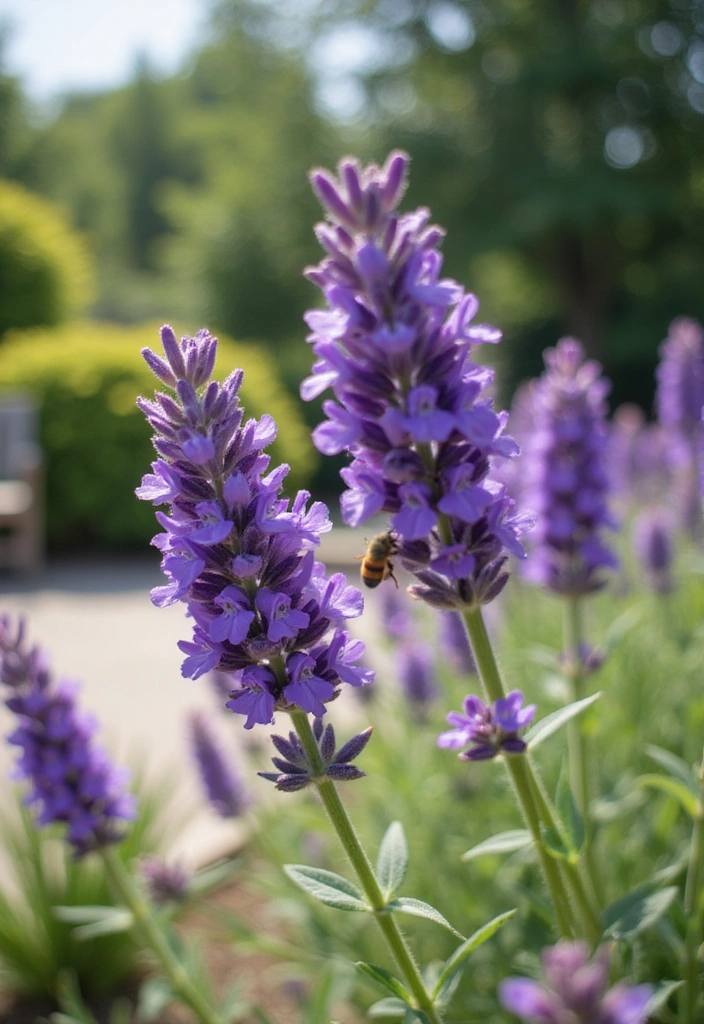
Lavender is not just a beautiful flower; it’s a remarkable ally in the battle against mosquitoes. Its calming fragrance not only creates a peaceful ambiance in your garden but also serves as a natural deterrent for pesky insects. The essential oils extracted from lavender are particularly effective at repelling mosquitoes, making it an essential addition to your outdoor sanctuary.
To cultivate lavender successfully, plant it in sunny locations with well-drained soil, and enjoy the vibrant purple blooms while reaping the benefits of its insect-repelling qualities. Here are some tips for nurturing your lavender plants: select a variety suited to your climate, such as English lavender for cooler regions or French lavender for warmer climates. Remember to water them moderately, as lavender thrives in slightly dry conditions, and regular pruning will help promote bushier growth and more abundant flowers.
Not only is lavender fantastic for keeping your garden mosquito-free, but it also attracts beneficial pollinators, enhancing the biodiversity of your space. Plus, you can harvest its stunning flowers to create soothing lavender sachets or essential oil for your home! If you’re interested, check out these products: lavender essential oil, dried lavender sachets, and lavender plants.
Imagine a cluster of lavender swaying gently in the breeze, surrounded by the cheerful buzz of bees drawn to its blossoms!
2. Citronella – The Classic Mosquito Repellent
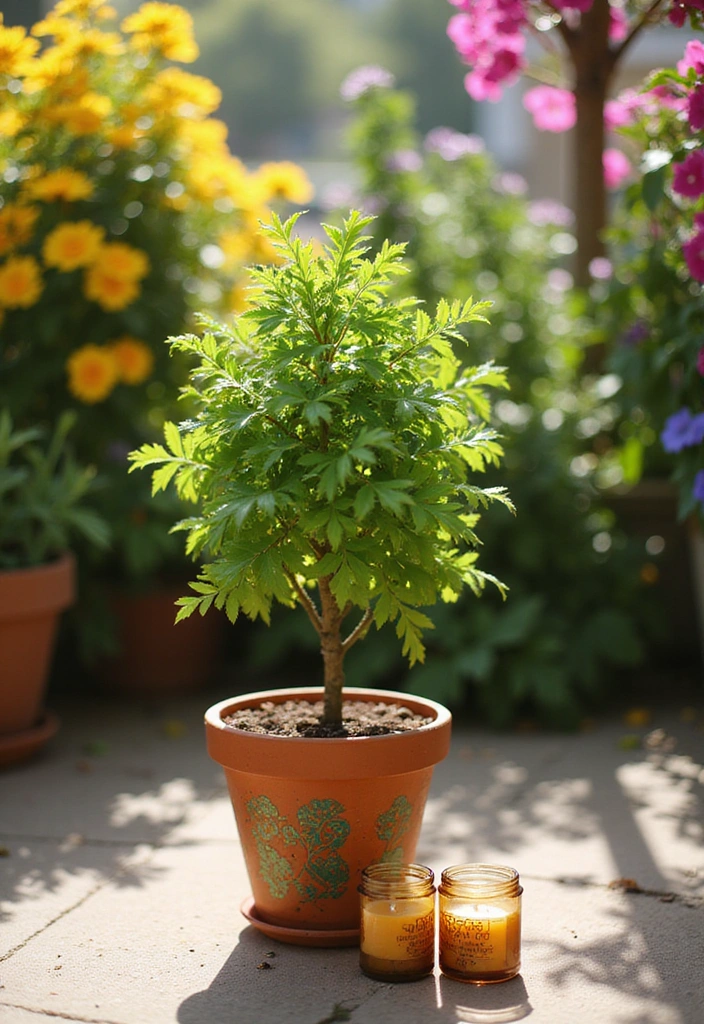
Citronella is arguably the most recognized plant for repelling mosquitoes, and it’s easy to see why!
Renowned for its invigorating lemony aroma, citronella effectively wards off mosquitoes and other bothersome insects. While it’s often found in citronella candles and sprays, planting it in your garden offers a sustainable and efficient way to enjoy a bug-free outdoor space.
This resilient plant flourishes in warm, sunlit areas with well-drained soil. For added convenience, consider growing potted citronella plants, which can be easily moved around your garden or patio to maximize its benefits wherever you are.
To enhance the effectiveness of your citronella plant, keep the soil slightly moist without becoming soggy to promote healthy growth. Regularly trimming the leaves encourages a bushier plant and releases more of its fragrant oils. For an even more powerful defense against mosquitoes, consider pairing it with other mosquito-repelling plants.
Not only does citronella help keep those pesky bugs at bay, but it also brings a tropical flair to your garden. Imagine a lush, vibrant citronella plant surrounded by colorful blooms, all soaking up the summer sunshine. You can also harness the power of citronella through citronella essential oil, which can be used in various applications to enhance your outdoor experience.
3. Marigolds – Nature’s Bright Shield
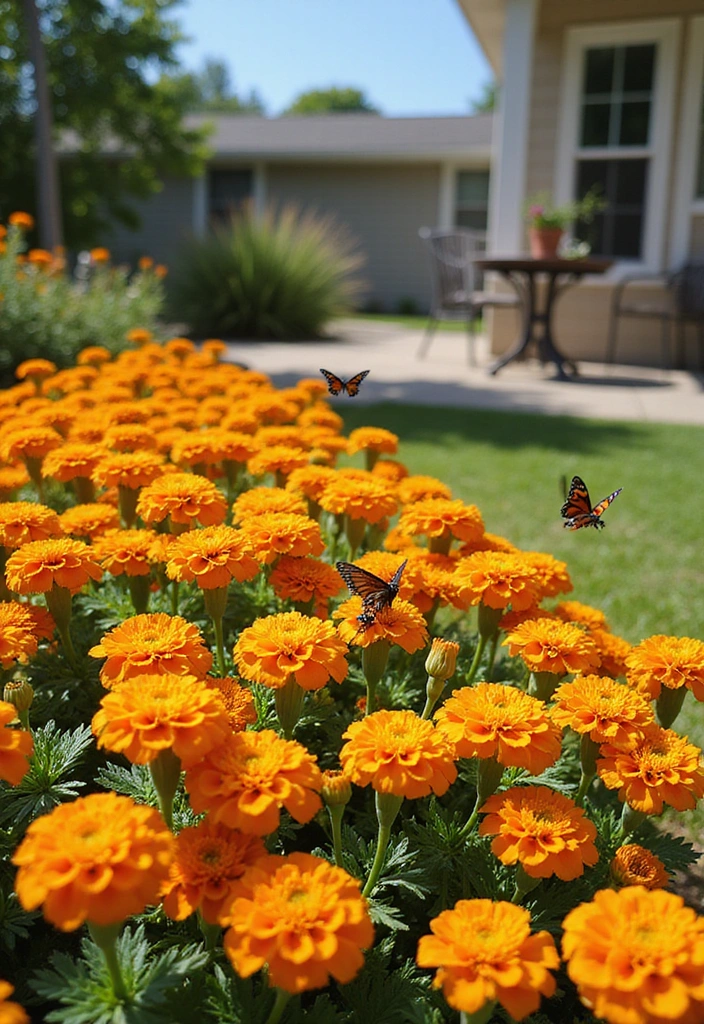
Marigolds are a delightful addition to any garden, boasting vibrant shades of orange and yellow that not only brighten your outdoor space but also act as a formidable barrier against pests.
These cheerful flowers release a fragrance that mosquitoes and other unwanted insects find unappealing, making them an ideal choice for planting around your patios or vegetable patches. By incorporating marigolds, you can create a more enjoyable outdoor experience free from pesky intruders.
To ensure your marigolds thrive, it’s essential to select a sunny location, as they flourish in full sunlight and well-drained soil. Regularly deadheading spent blooms will stimulate the growth of new flowers and extend the blooming period, ensuring your garden remains lively. For a breathtaking visual impact, consider mixing various marigold varieties for a dynamic color palette.
In addition to their pest-repelling properties, marigolds attract beneficial insects like ladybugs and butterflies, enriching your garden ecosystem. Picture a stunning garden filled with marigolds, surrounded by pollinators reveling in the blossoms while mosquitoes are kept at bay.
To get started, consider purchasing marigold seed packets to cultivate your own vibrant display. If you’re looking to grow them indoors or extend your growing season, grow lights for indoor planting can be a fantastic investment. Additionally, using organic fertilizer will help nourish your plants and promote healthy growth, ensuring a flourishing garden that is both beautiful and bug-free.
4. Basil – The Culinary Companion
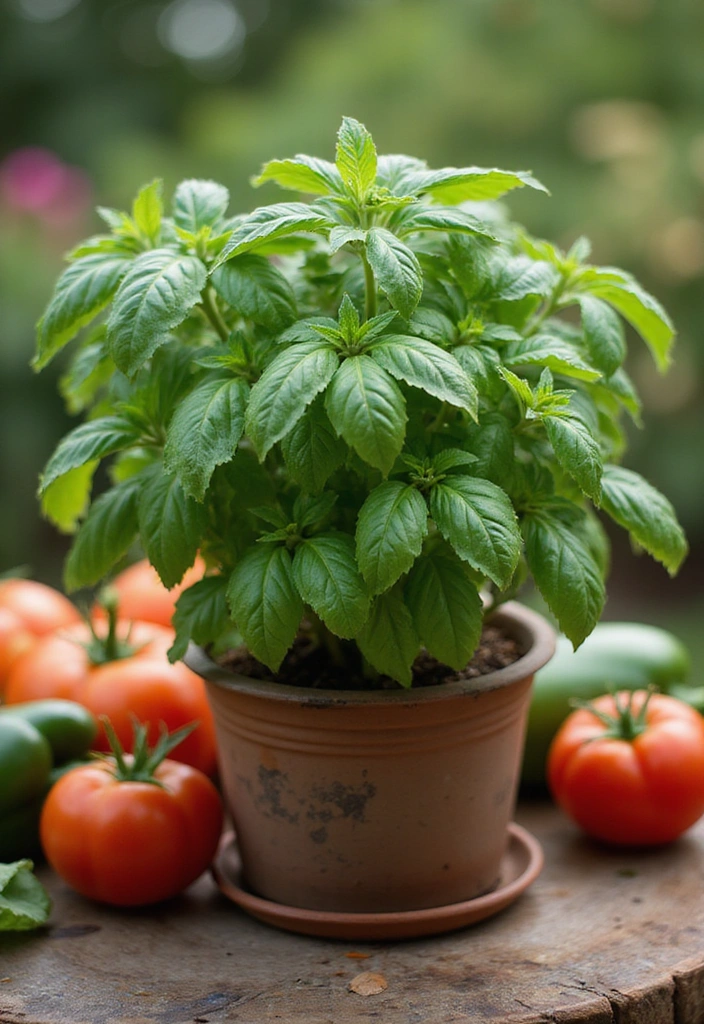
Basil is not only a delicious herb that enhances your culinary creations, but it also serves as an excellent natural mosquito repellent!
The robust aroma of basil acts as a deterrent for those pesky mosquitoes, making it an ideal plant for your garden or even a vibrant addition to your kitchen windowsill. With basil, you can enjoy fresh, flavorful leaves while simultaneously creating a bug-free environment.
To ensure optimal growth, consider planting basil in well-drained soil, ideally in a location that basks in plenty of sunlight. Regular watering is key, as basil thrives in moist soil; however, be careful to avoid overwatering. Additionally, harvesting the leaves frequently will promote bushier growth and keep your plant healthy.
Imagine a thriving basil plant with its glossy green leaves, complemented by a few tomatoes and peppers in your garden. Not only are you cultivating a beautiful space, but you’re also effectively deterring mosquitoes at the same time. If you’re ready to start your basil journey, check out these basil seed packets, or consider a complete growing experience with these herb garden kits. To give your plants the best start, don’t forget to use high-quality organic potting soil!
5. Rosemary – A Robust Aromatic
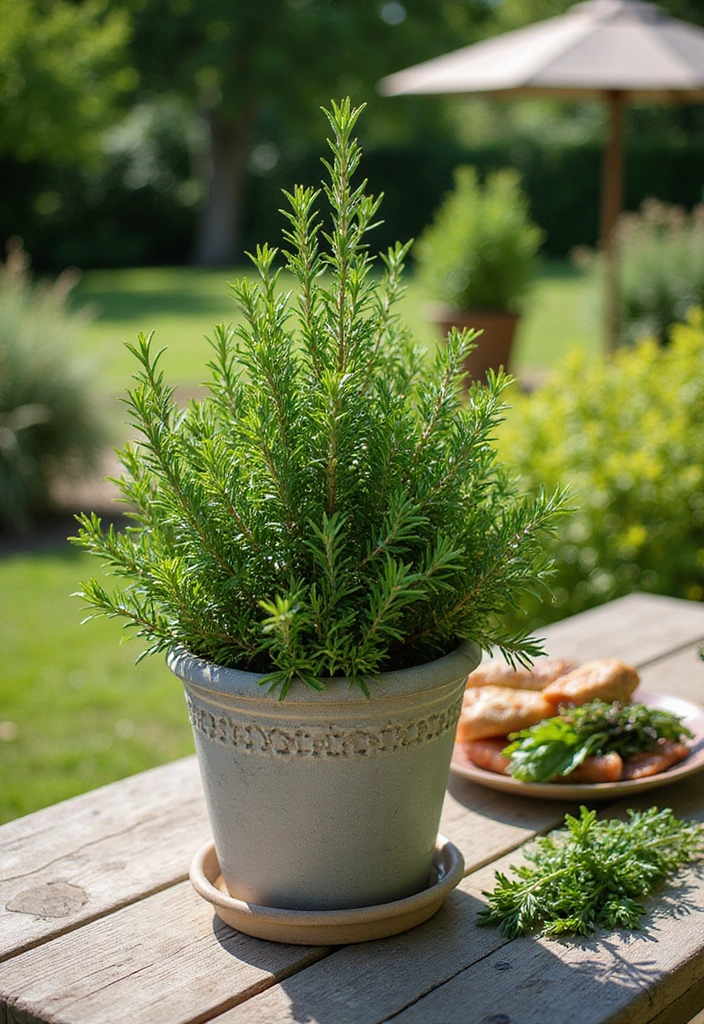
Rosemary is not only a flavorful addition to your culinary creations; it also serves as a natural mosquito repellent thanks to its potent aroma.
This resilient herb flourishes in various environments, making it a perfect choice for your outdoor garden. With its distinctive needle-like leaves and sturdy woody stems, rosemary not only adds a unique texture but also emits a scent that keeps pesky mosquitoes at bay.
To successfully grow rosemary, consider the following tips:
– Plant it in a sunny spot with well-drained soil, as this herb thrives in drier conditions.
– Water it sparingly, allowing the soil to dry out completely between waterings.
– Regular pruning will encourage new growth and help maintain its attractive shape.
In addition to driving away mosquitoes, fresh rosemary can elevate a range of dishes, from savory roasts to zesty marinades. Imagine a lush rosemary plant nestled among other herbs, its delightful fragrance creating a bug-free atmosphere while you savor a summer barbecue.
If you’re looking to start your rosemary garden, check out these rosemary seed packets to get started. Enhance your gardening experience with beautiful decorative pots that showcase your plants beautifully. And for easy harvesting, don’t forget to grab a pair of herb scissors!
6. Lemon Balm – The Refreshing Repellent
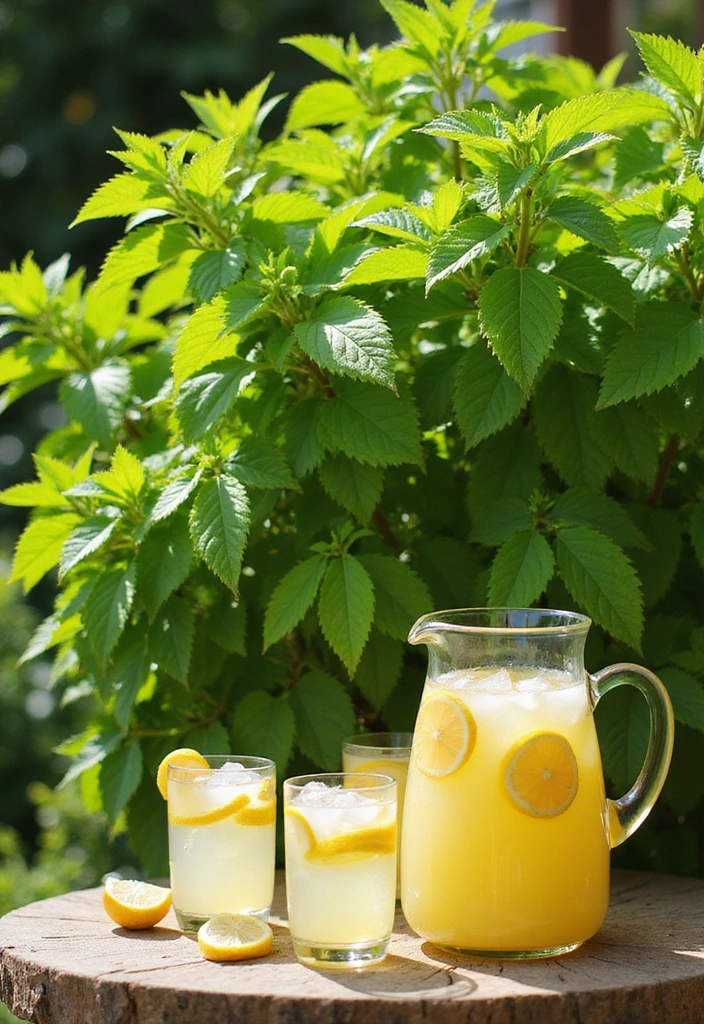
Lemon balm, known for its invigorating lemon aroma, not only enhances the beauty of your garden but also serves as a potent mosquito repellent.
This resilient herb thrives in a range of environments and is remarkably easy to maintain, making it a favorite among gardening enthusiasts. Its fragrant leaves emit a scent that naturally keeps mosquitoes and other pests at bay.
To cultivate lemon balm effectively, select a sunny or partially shaded location, as it flourishes in both settings. Ensure the soil remains consistently moist yet well-drained, and regularly trim the leaves to promote bushy growth and enhance its aromatic qualities.
Beyond its pest-repelling benefits, lemon balm is a wonderful herb for brewing teas and crafting refreshing drinks. Imagine a lush lemon balm plant, its vibrant green leaves shimmering in the sunlight, while nearby, a selection of herbal tea blends awaits to be enjoyed during your summer gatherings. To get started, consider purchasing lemon balm seed packets and planting them in charming decorative pots to enhance your outdoor space.
7. Catnip – The Feline-Friendly Repellent
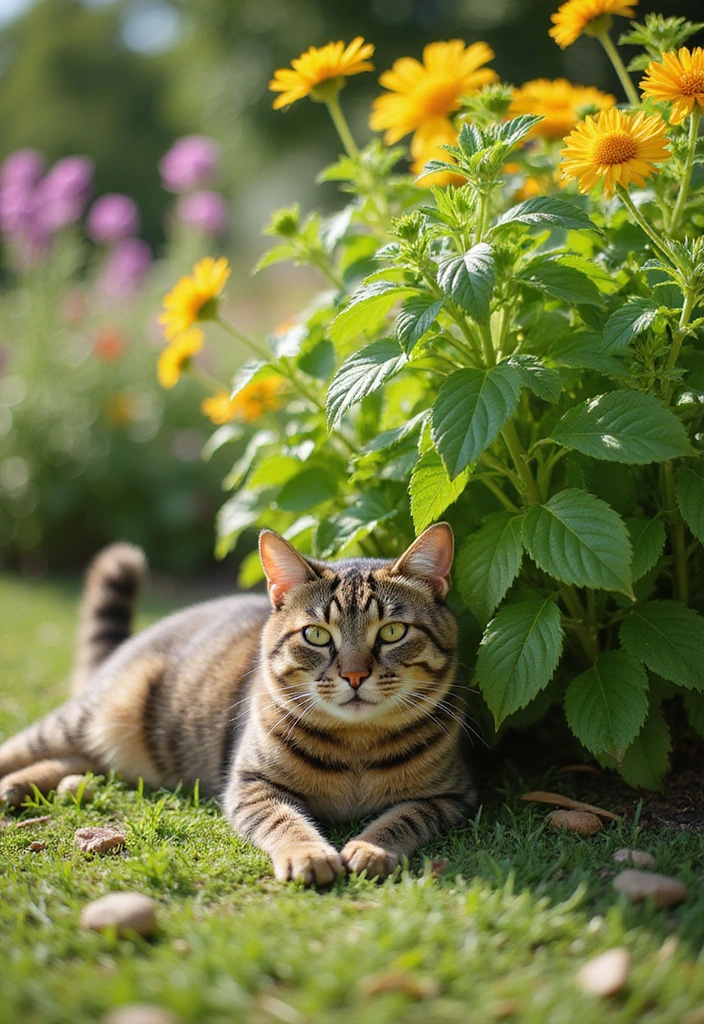
Catnip is not only a favorite among our feline companions; it also doubles as an excellent mosquito repellent! This resilient herb releases a scent that mosquitoes find quite off-putting, making it a valuable addition to any garden. If you have cats, they will adore the aromatic leaves and may even roll around in them, turning your outdoor space into a playful paradise.
To cultivate catnip successfully, plant it in a sunny area with well-drained soil, as it flourishes in various climates. Be sure to water it regularly, but allow the soil to dry out between waterings, since catnip prefers drier conditions. To keep your plants healthy and encourage fuller growth, don’t forget to trim them back periodically.
Imagine a vibrant garden where your cats play joyfully among the catnip plants, all while mosquitoes stay at bay. This herb not only contributes to pest control but also offers endless entertainment for your pets!
If you’re looking to start your catnip garden, consider grabbing some catnip seed packets. To keep your cats entertained, you might also want to check out some fun catnip toys. And for optimal growth, don’t forget to use organic fertilizer to nourish your plants!
8. Geraniums – The Colorful Deterrent
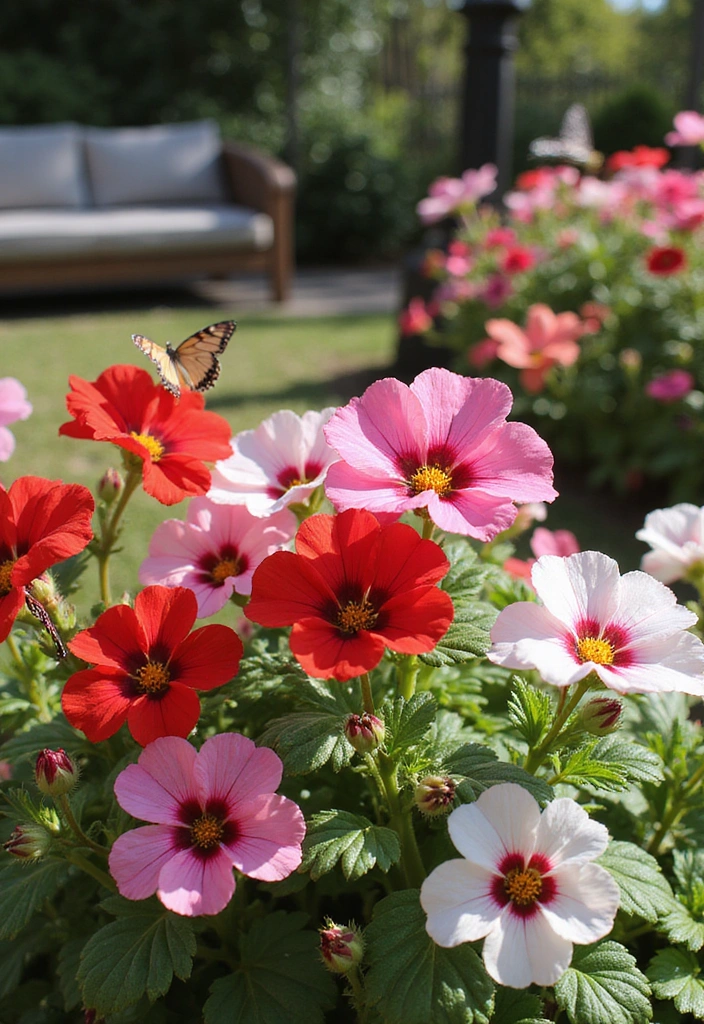
Geraniums are not just visually appealing flowers; they also act as a powerful mosquito repellent. Their delightful fragrance is known to deter these annoying pests, all while adding vibrant colors to your outdoor space. With a variety of types available, geraniums can elevate the beauty of any garden while simultaneously keeping bugs at bay.
To cultivate these lovely blooms, make sure to plant them in well-drained soil in a spot that gets plenty of sunlight. Water them moderately, allowing the soil to dry out slightly between waterings for optimal growth. Don’t forget to deadhead spent blooms; this practice encourages new flowers and helps maintain their stunning appearance.
Picture a garden adorned with colorful geraniums in full bloom, their petals dancing in the summer breeze as they ward off mosquitoes. Additionally, these flowers can attract butterflies, enhancing both the beauty and biodiversity of your garden. To get started, consider purchasing geranium seed packets to plant your own colorful display. For a charming touch, use decorative planters that complement the vibrant blooms. To ensure healthy growth, don’t forget to apply some organic fertilizer to nourish your plants.
9. Pennyroyal – The Little Powerhouse
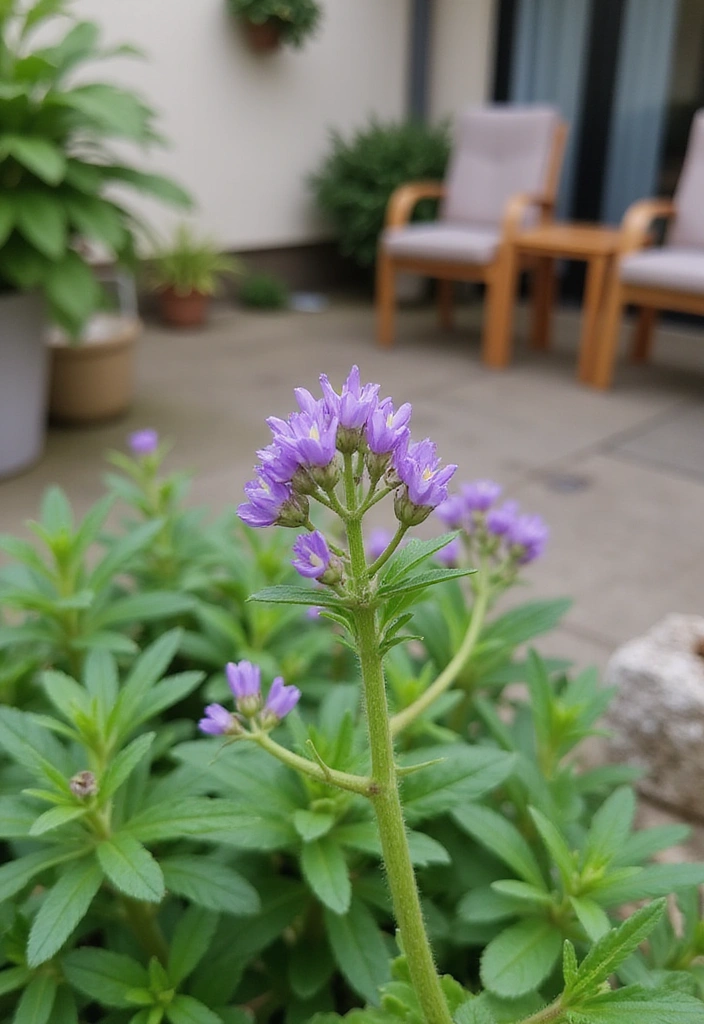
Pennyroyal is a lesser-known gem among mosquito-repelling plants, yet it proves to be exceptionally effective. As a member of the mint family, it emits a strong scent that mosquitoes find unappealing, making it an excellent choice for your outdoor garden. This low-growing plant not only fills in gaps beautifully but also provides lush ground cover, adding charm to your landscape.
To cultivate pennyroyal successfully, plant it in a sunny or partially shaded area with moist, well-drained soil. Regular trimming is essential to maintain its health and promote bushy growth. However, be mindful of its invasive nature; utilizing decorative pots can help you control its spread while enhancing your garden’s aesthetic.
Imagine a vibrant patch of pennyroyal, adorned with small purple flowers, all while serving its dual purpose as a mosquito deterrent. Not only does this plant safeguard your outdoor spaces, but it also adds an aromatic flair to your garden. For those interested in starting this journey, consider picking up pennyroyal seed packets and delve deeper into the world of gardening with organic gardening books to enrich your knowledge.
10. Scented Geraniums – Aromatic Beauty
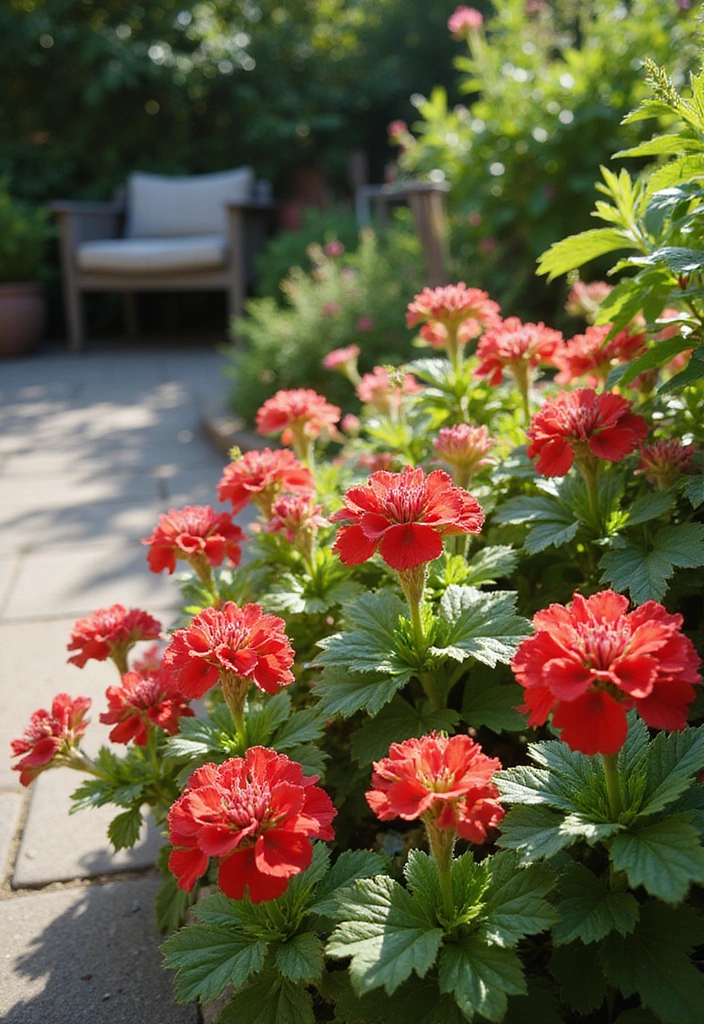
Scented geraniums are a stunning addition to any garden, offering both beauty and a fragrance that mosquitoes find unappealing. These delightful plants come in a variety of scents, including rose and mint, creating a unique sensory experience that enhances your outdoor space.
They can thrive in pots or be planted directly in the ground, making them a versatile choice for any gardening setup. To cultivate these aromatic beauties, select a sunny spot with well-drained soil and water them moderately, allowing the soil to dry slightly between waterings. Regular pruning will encourage bushy growth and intensify their fragrant qualities.
Imagine a garden filled with vibrant scented geraniums, their lush leaves releasing enchanting aromas while keeping pesky mosquitoes at bay. To get started, consider purchasing scented geranium seed packets, which will allow you to grow these plants from scratch. Pair them with decorative planters to enhance the aesthetic of your garden, and ensure you use organic potting soil for optimal growth. Embrace the beauty and functionality of scented geraniums this summer!
11. Neem – The Natural Protector
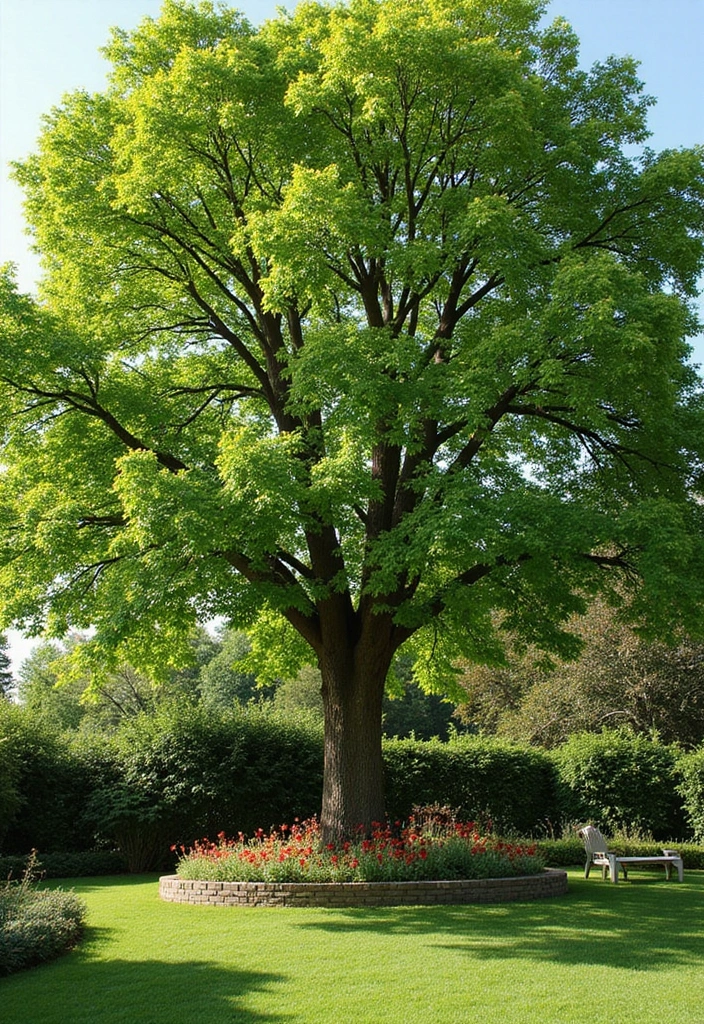
Neem is a remarkable plant celebrated for its potent insect-repelling abilities. The leaves and oil derived from the neem tree are packed with compounds that effectively ward off mosquitoes and a variety of other pests. For those seeking an organic approach to pest control in their gardens, neem is an outstanding choice.
To successfully cultivate neem, choose a sunny location with well-drained soil, as this tree thrives in warm climates. Ensure to water it consistently while allowing the soil to dry out between waterings. Regular pruning will help maintain its shape and promote healthy growth.
Envision a majestic neem tree towering in your garden, its dark green leaves glistening in the daylight. This natural protector not only deters mosquitoes, but it also enhances the overall health of your garden by attracting beneficial insects. Consider incorporating neem oil into your pest control regimen, or start from scratch with neem seed packets. You may also explore various organic pest control products that harness the power of neem for a healthier, bug-free garden experience.
12. Thyme – The Flavorful Repellent
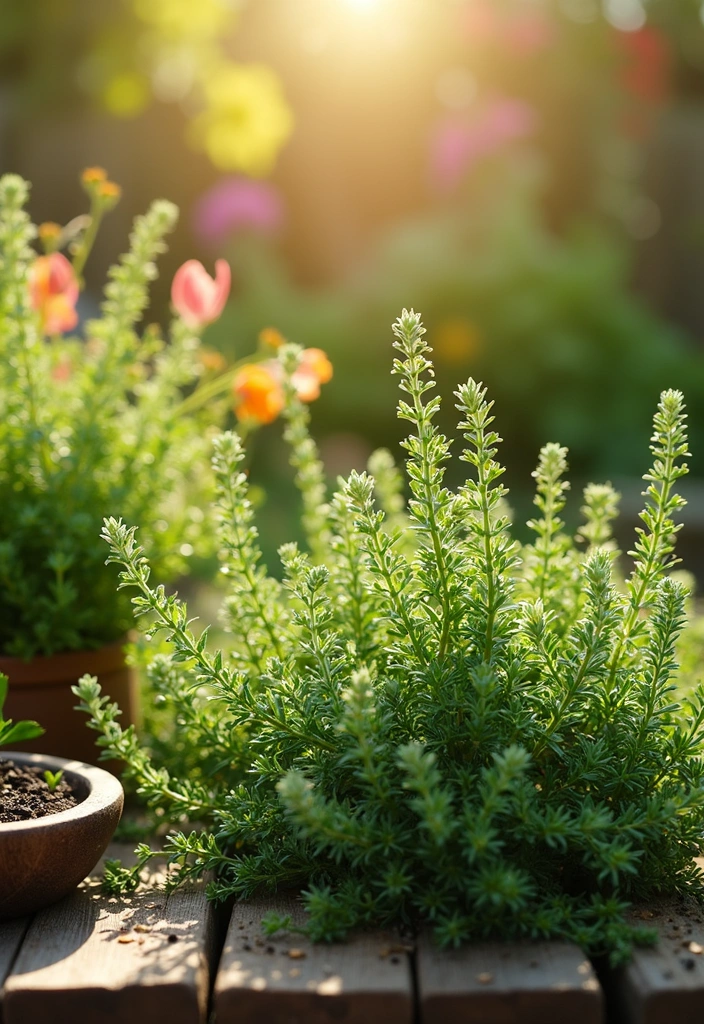
Thyme is not only a flavorful herb that elevates your culinary creations, but it also acts as a powerful natural mosquito repellent. This resilient plant releases a strong aroma that mosquitoes find unappealing, making it a fantastic addition to your garden.
To successfully cultivate thyme, plant it in well-drained soil and choose a sunny location, as it flourishes in warm weather. Be sure to water it sparingly, allowing the soil to dry out between watering sessions, and regularly prune the plant to promote bushy growth and enhance the flavor of its leaves.
Imagine a lush patch of thyme in your garden, contributing both to your meals and to a bug-free outdoor space. You can get started by purchasing thyme seed packets or an herb garden kit to simplify the process. To ensure your plants thrive, consider using organic fertilizer to provide essential nutrients. Enjoy the dual benefits of flavor and protection in your outdoor space!
Conclusion

Summer should be a time for relaxation and enjoyment, and with these 12 incredible mosquito-repelling plants, you can create a blissfully bug-free environment in your outdoor garden.
Incorporating these plants not only enhances the beauty of your space but also provides a natural way to deter pesky mosquitoes, allowing you to truly enjoy your summer evenings.
So go ahead, plant these beauties and soak in the summer sun without the worry of buzzing pests!
Note: We aim to provide accurate product links, but some may occasionally expire or become unavailable. If this happens, please search directly on Amazon for the product or a suitable alternative.
This post contains Amazon affiliate links, meaning I may earn a small commission if you purchase through my links, at no extra cost to you.